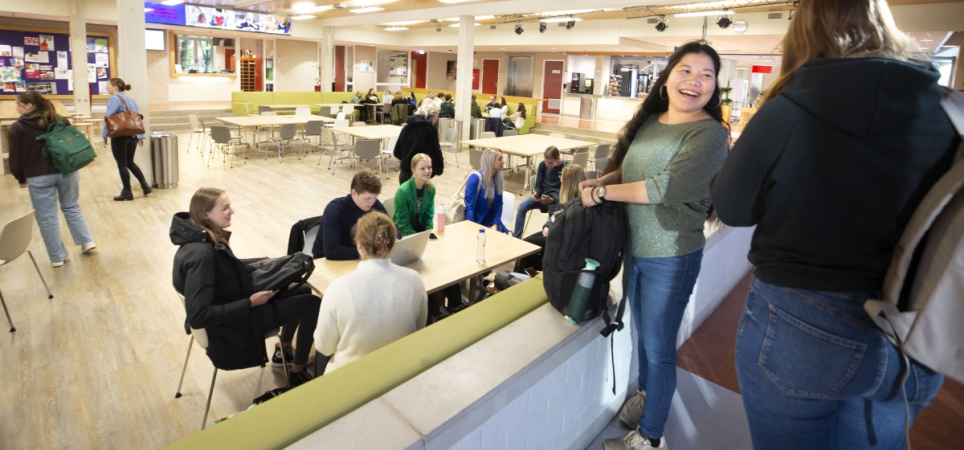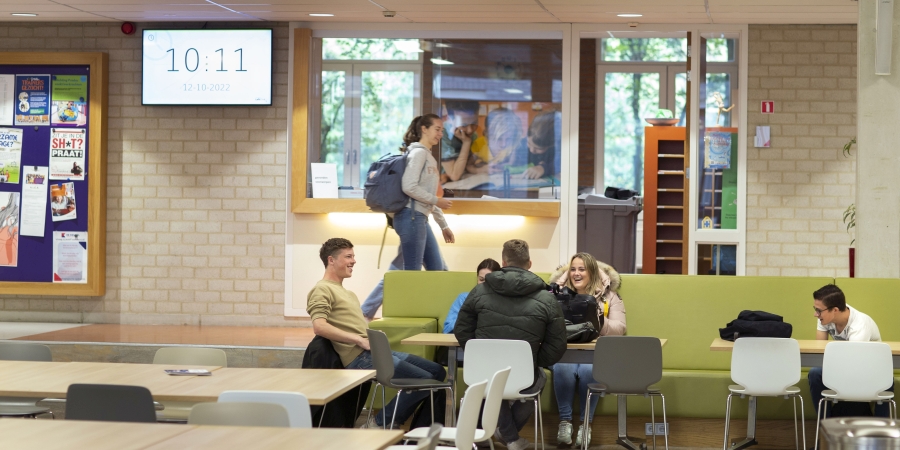Pabo has plenty of growth opportunities
Every year, the full-time PABO brings almost four thousand new starters to the labor market. Not enough to solve the teacher shortage. According to researchers, the influx can rise again after years of ailment. The opportunities and bottlenecks at a glance.

“We have built additional rooms to cope with the growing influx”, says Robert Verbruggen. “25 percent more first-years this academic year.” Verbruggen is chairman of the board of the Pedagogische Hogeschool de Kempel, an independent teacher training college in Helmond. The Hogeschool van Arnhem en Nijmegen (HAN) noted a plus of 16 percent at the two locations. “During the three open days, I already got the feeling that things were going well,” says teacher training college teacher Koen Steeman. “It was always packed, they were practically hanging out of the windows.” It is no coincidence that the courses are growing. They work on recruitment.
Chance 1: The starting position is good
The starting position of the teacher training college is fine. The program ranks high in the top ten of the most popular HBO programmes, at number three to be precise. The full-time teacher training college is also the main supplier of new primary school teachers. Every year around four thousand new teachers graduate. Seven out of ten starters in education have completed that four-year PABO.
But let's not forget that the popularity of the PABO has almost halved in the past two decades. In 2020, registration peaked for a while, only to fall again immediately. For this academic year, the pre-registration figures show a very small plus. In their letter about the Teacher Strategy education ministers Robbert Dijkgraaf and Dennis Wiersma say that 'unorthodox measures' are needed to tackle the teacher shortage. But could old-fashioned measures also work, such as increasing the influx of full-time teachers? Certainly, say researchers.
You can read this article for free from the November Education Magazine. Want to stay informed about everything that is going on in education? Join the AOb! And receive the Education magazine every month.
CHECK ALL THE BENEFITS OF MEMBERSHIP
Opportunity 2: Pabo has growth potential
The teacher training college has significant growth opportunities, shows the research Outflow of secondary education to teacher training courses from ResearchNed. This is because there are secondary schools where zero pupils have opted for teacher training (primary and secondary education) over the years. On the other hand, there are HAVO and VWO schools where the choice always exceeds 20 percent. “Schools where many young people opt for teacher training are usually located outside the Randstad conurbation and more often have a Christian character”, researcher Wouter van Casteren of ResearchNed outlines as characteristics.
According to the research, what really matters is the design of the study choice information. When it starts early, is more intensive, and teacher training has a place in it, more young people opt for this teacher training. “There is a group that knows from an early age that they want to become a teacher. You don't have to convince them. But a much larger group is quite interested in the teaching profession, but is still in doubt”, notes Van Casteren. It is precisely those doubters who benefit from intensive career orientation and guidance.
Many students think they know what a teacher is doing, so reject it as an option. But they do not see many aspects of a teacher's work
That is also the experience of Minette van den Bemd, herself a school dean and policy officer at the Association of Educational Supervisors (Bind). “Many students think they know what a teacher is doing, so they reject it as an option. But they don't see many aspects of a teacher's work.”
To promote the choice for studies in that sector, the technology sector has a strong lobbying campaign. Such as Jet-net, Youth and Technology, which links companies and schools. Van den Bemd sees such initiatives being created regionally for teacher training, by offering follow-up days at schools. “Those kinds of rich experiences are very important, so that students know better what I can do and what I want.” The message of strengthening career orientation has been picked up by the Ministry of Education. The letter about the Teacher Strategy states that study choice information as a whole must be improved and that attention must be paid to the teaching profession.
Opportunity 3: Recruitment works
The growth in the number of full-time teacher training students at HAN may well be the fruit of an in-depth investment in recruitment. “Due to the declining intake and the teacher shortage, it was decided five years ago to appoint one extra marketing communication employee for the teacher training college,” says Toke Goseling, who was hired at the time to develop a new approach.
Regional cooperation with primary schools and school counselors is essential. There is a group of trained students who provide information on request in secondary education. In addition, the program 'Look in the class' is running. Where in the past interested young people were advised to browse their old primary school on their own, this is now tightly organised. Kijkje in de Klas arranges that potential first-years spend part of a day with a pool of schools with which HAN collaborates.

Pedagogische Hogeschool de Kempel is an independent PABO in Helmond. The teacher training college has been voted the best in the Netherlands eight times in a row.
In Amsterdam, teacher training institutes, schools and the municipality are tackling the teacher shortage together. For example, they have managed to keep the influx stable, while a number of large cities will again fall into the minus in 2022. One of the pluses of the collaboration is that there is now one gateway for the teaching profession, the website and campaign Rather for the class. In addition to attracting lateral entrants, the campaign aims at more students at the Ipabo and Hogeschool van Amsterdam teacher training colleges.
The municipality of Amsterdam organizes the education 'Teacher for a day' together. It is an internship for HAVO and VWO students to experience what it is like to teach at an Amsterdam primary school. Eric Westhoek, chairman of the board of Ipabo, hopes that the intensive collaboration with primary and secondary schools will have a side effect. “We have to work to ensure that teachers in secondary education see themselves as ambassadors for the education sector. Otherwise it will be very difficult to find enough teachers in the Randstad.”
Bottleneck 1: More or less customization
The previous cabinet wanted to make teacher training courses more attractive by making them more flexible; more customization for students. Teacher educators already have that course in the Education magazine a few times*In April this year, teacher educators Auke van Nie and Sjoerd van Vliet wrote the opinion 'Flexibility in teacher training is asking for accidents'. In February, teacher trainer Wim Borguis indicated why he plans worrying. And in the spring of 2021 the Education magazine published: 'Teacher training is on the shovel'. criticized. The new cabinet will continue that approach. Chairman of the board Robert Verbruggen van de Kempel is not very happy about this. Characteristics of the independent teacher training college in Helmond are small scale, personal attention and structure. The teacher training college has been named the best in the Netherlands eight times in a row.
Flexibilization is not the best choice for HAV students and MBO students. We offer students a lot of structure and attention during the first two years
Verbruggen: “Customized training is interesting, but the trend towards more flexibility is not the best choice for HAVO and MBO students. We offer students a lot of structure and attention in the first two years. We first introduce these young people to the water and only swim themselves in the third and fourth year. We do participate in flexibilisation, but in our own way and at our pace.” According to him, this pays off in well-trained primary school teachers. “Schools want to have our graduates.”
Bottleneck 2: Admission tests
The introduction of admission tests in 2015 meant a dip in the registration of MBO students. Almost all PABOs now provide preparation courses, either at the ROC or at the PABO itself. An additional advantage of the latter variant is that MBO students already get to know the university of applied sciences. They find the tests exciting, notes teacher training college Koen Steeman of the HAN. “For MBO students, these tests are one of the most important topics on open days.” Good information helps in this respect, large groups of MBO students come to the PABO in both Nijmegen and Helmond. They usually complete it successfully.
They also notice that the tests act as a threshold in Amsterdam. Both Ipabo and AUAS have a low intake from MBO. “There is a different population at the ROCs in the area,” said Eric Westhoek, chairman of the board of the Ipabo. “Many test items are far removed from them. The clock cup people, JP Coen, don't say that much to MBO students.”
Since this academic year, the tests do not necessarily have to be taken for admission, they are also allowed during the first year. Ipabo and HvA work with boot camps for the group that still has to take the tests. “And next year we will experiment with portfolios instead of tests.” According to the ministry, these new possibilities should 'optimize' the influx. With the reassurance that 'we emphatically do not do this to lower the intake or final level'.
The image of a craft training course is gone. That's positive
In Nijmegen, now that the test no longer only has to be taken in advance, they are concerned about the quality of the intake. “Are we keeping all those students inside”, wonders HAN lecturer Koen Steeman. Because now MBO and HAV students have to complete the tests during the first year, an extra study load. “Is that going to mean a higher dropout rate?” Steeman sees the test beforehand as a quality stamp. “You show that you meet the level. The strict admission standards - for MBO and HAVO - have also created a more serious image for the PABO. The image of a craft training is gone. That is positive.”
Opportunity 4: The power of campaign
In almost all of the Netherlands, plans are being made for regional campaigns to boost the intake of teacher educators. With more and less success. Could a national campaign help? “That always helps, the regional and national components must reinforce each other”, thinks Ipabo board chairman Eric Westhoek. “Together, they must be building blocks to reduce the deficit.”
Plans are already with the Ministry of Education, as a follow-up to the campaign The job of life from the spring of 2020. This aimed mainly at improving the appreciation for teachers, for the education sector itself. Students and lateral entrants were not the main target group. The campaign was scaled down due to the corona pandemic. Work is now underway on a follow-up in which the ministry is targeting secondary school students to 'enthuse them to become teachers'.
For doubters, guidance and teamwork are important. That being a teacher is a social profession, to help children and young people further in their development
Based on the research, ResearchNed researcher Wouter van Casteren does see points for attention for both regional and national campaigns. “Until now, knowledge transfer has often been emphasized as the primary role of the teacher. But that does not work well, the transfer of knowledge speaks for itself. Guidance and teamwork are important for doubters. That being a teacher is a social profession, to help children and young people further in their development. Plus working in teams; that you are not alone.”


